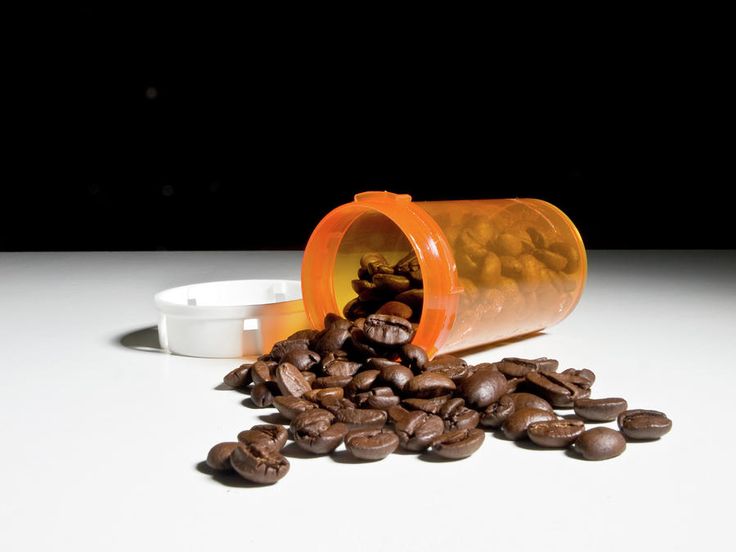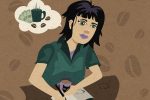As a barista, I hear “I’m so addicted to coffee,” followed by an awkward laugh to disguise the seriousness of their play-addiction, at least 30 times a day.
It’s not that I care about your health; I’m just taking your order because that’s what I get paid for, but I do wish that coffee addiction wasn’t considered such a joke, because a casual latte habit can turn into a serious issue really quickly. The problem is not necessarily addiction to the sweet taste of cappuccino, and the real issue is beyond handing the cashier your money.
Coffee dependence is not the desire to have coffee, but rather a series of underlying symptoms that come as a result of not having the beans’ magical ingredient—caffeine. Although identifying dependence may seem tricky, a general rule is the physical need for caffeine’s presence within the body.
If your body relies on coffee, then it will go haywire without it, causing you to experience withdrawal symptoms, such as headaches, lethargy, depression and even heart-rhythm abnormalities.
But that’ll never happen to you, right? Dark-roast drinkers like to think they’re exempt from sickness, myself included, but most people, especially students, aren’t as powerful as they think they are, and the result is that they mistreat their bodies by sacrificing their health for success.
Coffee seems like a godsend because it provides an energy boost that many students so desperately need, but before you start on that second cup, allow me to tell you my own experience with caffeine dependence.
As a busy sophomore, I found myself rushing to get to class, work and finish my homework. Productivity is what I live for, and I cannot spend a day without getting a workout in or getting a head start on the week’s readings.
However, I am not as superhuman as I would like to think, and like many other students, I am not exempt from buying coffee before morning classes. Back then, I bought coffee once a day without an issue, until one day in November I started feeling strange.
I questioned depression as a possibility, but I couldn’t find a reason for the sadness. But, at the same time, I couldn’t shake the looming feeling of depression I had in the mornings that kept creeping up on me if I missed my morning coffee.
My bank account sadly held but one Andrew Jackson, so I couldn’t afford to buy any lattes. I kept asking myself if I could spend what I had left in my account, but it was time to face the truth. I wouldn’t be able to buy coffee for awhile.
The depression didn’t go away, and neither did the lethargic state I seemed to be floating in. Before I would deny being tired, but at that moment in time, I could no longer ignore the energy I lacked.
I flew through the weeks in a state of perpetual malaise; I was tired and felt strung out, but was too weary to do anything to seriously change it. On payday, the day I longed for, I felt my life shatter at the first sip of iced coffee.
My heart was beating abnormally because of the caffeine in my system, and, as does every millennial with shitty insurance, I ignored the feeling. Who has time to go to the doctor?
Saturday morning I woke up to my world spinning, still in a lethargic state, but accompanied this time by vomiting. During my forced visit to the doctor’s office, the nurses asked me what I had done differently in the past week, and quickly the doctor confirmed I was having caffeine dependence issues.
On the day of my visit, I was experiencing the worst of withdrawal, but it was not just the symptoms that hurt me. The most painful part of the experience was finding out that I had to go on a caffeine detox for at least a month.
I was livid; how could I survive finals without coffee? Specifically, how do I survive when my body was punishing me for not giving it the substance it needed? The irony of caffeine dependency, and all dependency, is that to bring about the end of your symptoms, you need more of the substance that you are addicted to, which will only perpetuate the cycle further.
During my next visit to the doctor, I discovered a month was not enough to recover. My physician explained that I needed to stay off coffee for at least six months.
As a result, my last semester at community college was a living hell. Every time someone sipped on an iced coffee at work I wanted to hurt them. But, as my fall back into withdrawal symptoms had confirmed January, I needed to let the substance go completely, otherwise I was going to further harm myself. Frankly, I was done with feeling like shit every time I woke up, so I made up my mind to let the coffee go.
I stuck to my decision, and despite it, somehow pulled off a 4.0 GPA that semester, sans coffee. Later, in July, when I took my first glorious sip of cold brew, I found a new sense of control. The taste of coffee after the long, six-month drought was extremely rewarding.
Regardless, it was hard finding a balance between drinking and abstaining from coffee once I had the liberty to do so. As someone who has experienced withdrawal, I know caffeine dependence can make your life a living hell. You’re fighting an addiction and fighting to detox your body simultaneously, which often exacerbates withdrawal symptoms. The journey to recovery is terrible, frustrating and caffeine-less.
While I understand the feeling that coffee gives, I advise you to please be cautious of your choices. Don’t become dependent on caffeine, because if you come to experience withdrawal, you might wish you weren’t alive.
As for me, it has been two years since my last battle with dependence, and I have proven victorious. I’m a barista now, so I don’t think there’s a better way to tell addiction, “I kicked your ass.”


















[…] a series of underlying symptoms,” explained Karen Juarez, a University of Illinois student, in an article about her struggles with coffee addiction. Specifically, said Juarez, dependency comes down to a […]
[…] a series of underlying symptoms,” explained Karen Juarez, a University of Illinois student, in an article about her struggles with coffee addiction. Specifically, said Juarez, dependency comes down to a […]